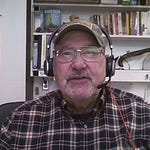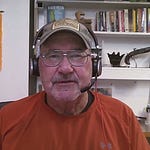My hands were sweating and my breath came in short gasps. The cheap Timex wristwatch told me I had only a few minutes to complete the exercise; the second hand crept inexorably around the face, clicking off the seconds in silent prediction of doom. Each inaudible notch was a step closer to the death of my career aspirations.
Curse the second hand!
I shuffled the papers again, reviewed my hurried notes on each of the 12 items, made a haphazard stack of them, and was still fretting over the “catalog update notice” when the door opened.
A short, rotund man old enough to be my father stood silhouetted in the doorway, his face stern and business-like. “Time’s up. May I come in?” he asked.
“Sure.” I tried not to mumble. Never let ‘em see you sweat, I told myself, and swiveled to face him. “Have a chair.”
“Thanks,” he said, and settled himself into the only guest chair in the small hotel room. He opened his folder and studied a page. The leather folder was held at a slight up angle, preventing me from seeing his notes.
“Let’s get started,” he announced, frowning at his papers. “Tell me about Item One, the dental appointment.”
I took a breath. “I decided to cancel it. I’ll call the dentist later today and see if I can re-schedule.” My voice trembled slightly and I noted my hand holding the ball-point pen was shaking. I ordered the hand, which seemed to belong to someone else, down onto my knee to still the trembling.
Mr. Green — no doubt not his real name— frowned, studied his papers, and made a small check mark with his pen. I strained to see what he had marked, to no avail.
This is going to be a long day, I thought.
“And what about the memo from Chris?”
Memo from Chris? I commanded myself not to panic. Where the heck is THAT one? I shuffled the papers before me and came up with it. The page shook in my hand as I tried to read my scribbled words.
The stress is real
I was 23 years old, held a job that paid $.25 an hour over minimum wage, had no savings whatsoever, and had a new college degree that qualified me to do nothing but go back to school — which I could not afford, and which did not interest me. A telephone call from an anonymous personnel recruiter at a mega corporation had responded to my unsolicited resume. The bored voice had begrudgingly advised me to apply for a sales position through normal channels.
Sales? Sure. It’s not digging ditches. I’ll give it a try.
Which is how I found myself a week later in a sterile hotel room at the beginning of a 6 -hour “Assessment Center” exercise, trying desperately to convince self-assured, confident strangers 20 years older than I that I would be a great fit for their exciting, expanding international business, dominating an industry I knew absolutely nothing about.
Who was I trying to kid? I was way out of my depth.
You always hear: “Oh, don’t worry. It will never be as bad as you think.”
What a lie. The Assessment Center was much worse than I had envisioned.
The “Inbox Exercise” — they had assigned me a fictitious role as a sales rep in some business and given me a dozen made-up memoranda on various topics, asking me to decide how to deal with each — was merely a lightweight opener to what would be an increasingly challenging set of impossible circumstances. It got worse as the day wore on. Mental and emotional exhaustion set in.
As a candidate, I was confronted with seemingly real-world problems that had no good solutions, yet I was required to specify my course of action. There was almost no way to win, which was the point.
They needed to see how I would respond under stress. Not very well, I decided.
Ten days after the test, I got a second call from the Personnel woman, who offered me a start date. I was in.
Incredible. Are you sure you have the right guy?
The lies are deceptive
The psychological literature calls it Imposter Syndrome, the conviction that I am not qualified to pursue the opportunity that is open before me. The self-talk generated by Imposter Syndrome says exactly the things I had heard in my head at age 23:
Who do you think you are?
There is NO WAY you are capable of doing this job!
As soon as people find out the truth, you will be a laughing-stock!
You will never accomplish anything significant for the rest of your life!
Frankly, I still hear those accusations in my head today.
Imposter Syndrome does not get any better with age. In many ways, it gets worse. It becomes debilitating, keeping us from making contributions where they are most needed.
Thankfully, most of us learn to simply ignore that inner voice — to a point.
The Costs of Imposter Syndrome
. Stagnation. A 2016 article in Frontiers in Psychology suggests that the “Imposter Phenomenon” is real, and prevents qualified candidates from advancing their careers to the next level.
. Perfectionism. A 1978 study shows that many professionals — especially professional women — believe “that they are really not bright, and have fooled anyone who thinks otherwise.” This, according to the authors, drives many of both sexes to overwork, attempting to show over-the-top excellence far beyond what is required to do the job.
. Stress and anxiety. Meanwhile, the very real (and, perversely, very imaginary) fear of being unmasked as an intellectual fraud has led many into “anxiety, fear of failure and dissatisfaction with life.”
What an overwhelming burden to bear! I cannot believe that God ever intended us to be saddled with such a load. But there is a fourth cost that is as bad, or worse, than the others. I have no source for this one other than my personal observations. (I take some refuge in Proverbs 20:12 The hearing ear and the seeing eye, the LORD has made both of them.)
I believe the Imposter Syndrome demands this price:
. Leaving others stranded without your help. In about 2007, our tiny Protestant congregation of 75 members decided it was time to build a new church building. Coincidentally, a man I’ll call Archibald decided that he and his wife would leave us and begin attending a different church. There was no problem; no conflict had occurred. Family considerations dictated the move, which was accepted and approved by all. We were sad to lose the family, but life goes on.
However, Archibald, a clear-thinking, practical and competent man of about 55, was key to any project requiring hands-on work and real problem-solving. He was clearly the right choice to lead our new building project.
I thought: How are we ever going to do this without Archibald? It's impossible.
And then, Winston stepped up. Winston was 10 years younger but quite accomplished in his own small business. He was an Army veteran, had a wide range of experience working with contractors and was unafraid to express opinions. Without being asked, he recognized our situation and took the lead in managing the myriad of issues related to a sizable and highly visible building program.
The new church building stood on a heavily-traveled highway at the edge of town; everyone in the County could see the progress as it went up.
What sort of price would the congregation have paid if Winston had shrunk back from the task? I am sure if he had been asked about his qualifications, he would have answered humbly: “Somebody’s gotta do it, and it looks like I’m the right choice.”
When Imposter Syndrome is rejected, the benefits to others are widespread and usually impossible to quantify.
Fire your imposter syndrome
The literature suggests practical ways to overcome that inner voice that tries to convince you of the lie of your worthlessness. These are not rocket science solutions, and are so obvious that they are easy to ignore.
Track your accomplishments. Document your small victories, whether consistently cleaning up the breakfast dishes 7 days in a row, extinguishing small credit card debt, seeing your grandchild succeed in the dance competition… whatever. (I still take pride in the model clay-and-wire gorilla I helped my 6th-grader build for a class project 20 years ago. See? I can DO stuff!)
Remember what shepherd-boy David told King Saul about whether Goliath could be defeated in hand-to-hand combat: “Sure I can! I took down the bear and the lion when they came after the sheep! That giant ain’t no thing!” (1 Samuel 17:37, New Bohemian Ghormley Edition.)
Seek mentorship. Not to be mentored, but to mentor. There are those who need what you have. The more you make yourself available to others (“available,” not “thrust upon”), the more you can help. And the more confident you become.
In a sales meeting of 40 managers one time, a new, young 25-year-old female staffer attempted to explain the new cash sales incentive program to an audience of 3 dozen mid-level (predominantly female) managers her mom’s age. Where personal money is involved, emotions rise. The managers began to verbally assault the girl for the gaps they saw in the plan. Voices rose as anger surged.
Our boss, watching, did not take steps to control the situation. (I concluded later that she was willing to sacrifice the child staffer to avoid criticism of her own poor management.)
I hate to see a feeding frenzy destroy a career. Into this fray I inserted myself.
I have the unmerited benefit of being among the tallest people in any room, and on that day I was one of the few males in attendance. I was dressed in something just above business casual, khakis and a sport coat with a tie, which I suppose could have looked intimidating in the surroundings. I rose to my feet, uninvited, in the midst of the theatre. Quiet descended.
There were a few chuckles as friends — I had many among those present — realized I would attempt to calm the huddled masses yearning to be paid.
“What she is saying,” I said in a voice as clear and middle-manager-ish authoritative as I could manage, “is that her program is designed to provide reasonable incentives to each individual in your groups in a way that both offers you an override payout and also remains within budget.”
There was some rustling, a few murmurs of agreement.
“Further,” I added with a more stern tone, “she reviewed the plan with me earlier this week. She and I agreed there are holes that will be managed. I have agreed to help her review the progress of the payouts. It is not my plan, but I will be watching.” I gestured to the girl at the front of the room, who was now blushing furiously. “This woman is quite capable of executing a quality incentive program. We will not be disappointed in the results, IF our people perform to expectations.”
A little surprised that my peers were actually quieted by this outburst, I figured I had better quit while I was ahead. I took my seat and the meeting moved on.
Lifelong learning. Changing the focus from “How can I fail?” to “What new thing can I learn?” alters your inner dynamic remarkably.
Lifelong Learning in Later Life, a Handbook on Older Adult Learning (Brill Academic Publishing 2011), points out that chronological and institutionalized learning — elementary school through college — comprises basic things we need to know to function in society and career. What the authors call “third age learning” is what mature adults practice. It is most effective when it is organized, systematic and intentional.
The mere fact that we are able to master new subjects and new skills offers confidence and energy. It quiets that liar within who relentlessly attempts to convince us of our worthlessness. Ignore him.
A “Prairie Home” piano recital
Back in the day, I was a devotee of Garrison Keillor’s Prairie Home Companion, a weekly production of Minnesota Public Radio. Millions of us in the audience looked forward to every Sunday afternoon’s live 2-hour variety program. The centerpiece was Keillor’s monolog, a 10-minute tongue-in-cheek rendition of what life was like at “Lake Woebegone, my hometown, where all the men are strong, all the women are good-looking, and all the children are above average.”
I looked forward with eager anticipation to the same lead-in sentence every week: “It’s been a quiet week in Lake Woebegone…” whereupon the studio audience would erupt in cheers and applause. Keillor’s self-deprecating style of humor was laid-back and calm.
In one of his books — I don’t remember which one — Garrison Keillor told of his endeavor late in life to learn to play piano. He was musical but had never mastered the keyboard. He took lessons and practiced faithfully.
When he was ready, he scheduled a private recital for his wife. (Or perhaps girlfriend. I don’t recall.) He had chosen something simple and familiar, like Beethoven's Moonlight Sonata or some such. Keillor dressed in a tuxedo and formally entered the living room where the piano sat. His audience of one sat comfortably, probably sipping wine.
In his telling, Keillor got through the piece, which he had memorized, with minimal mistakes and only a few rhythmical hesitations.
It was an amateurish performance, but by golly! He had done it. Chalk one up to self-confidence.
Start before you’re ready
In the business of extinguishing Imposter Syndrome, my instinct is to take steps to banish the monster sooner rather than later. As with anything else, the longer you listen to the lie, the more it seems like the truth.
Eventually, the lie BECOMES the truth.
That is precisely where the Father of Lies wants you to land.
Challenge Question
Last week, Coach Ledford asked: Who is on your friends list?
This week, I challenge you with a companion question:
What is on your lifelong learning list?
List 3 skills or activities you wish to master, and note the first steps toward accomplishing those goals. That may be a plan to reach out to the community college and inquire about classes, or to research a subject online, or to visit the library to find information on an activity or hobby. Use Facebook, X (Twitter) or LinkedIn to identify sources of information and hook up with subject-matter experts.
Take steps to enrichen your intellect and embolden your confidence.
Download the Challenge Tracker to make your notes. Part of living Your Best Retirement is demonstrating intentionality. We are not here to impart data, but to obtain results. Write down your plans, execute them, and keep track of the outcomes.
What do the Scriptures say?
But David said to Saul, “Your servant has been keeping his father’s sheep. When a lion or a bear came and carried off a sheep from the flock, I went after it, struck it and rescued the sheep from its mouth.
When it turned on me, I seized it by its hair, struck it and killed it. Your servant has killed both the lion and the bear; this uncircumcised Philistine will be like one of them, because he has defied the armies of the living God.
The Lord who rescued me from the paw of the lion and the paw of the bear will rescue me from the hand of this Philistine.”
Saul said to David, “Go, and the Lord be with you.”
1 Samuel 17:34-37 (NIV)
Thanks for joining Your Best Retirement this week. Stay tuned. We have more to say along these lines.
When you give us a Like, it induces others to follow along. We are bold to think the content is worth absorbing.
So, we would ask you to click the Like button. And don’t forget to Share. See you next time.















Share this post